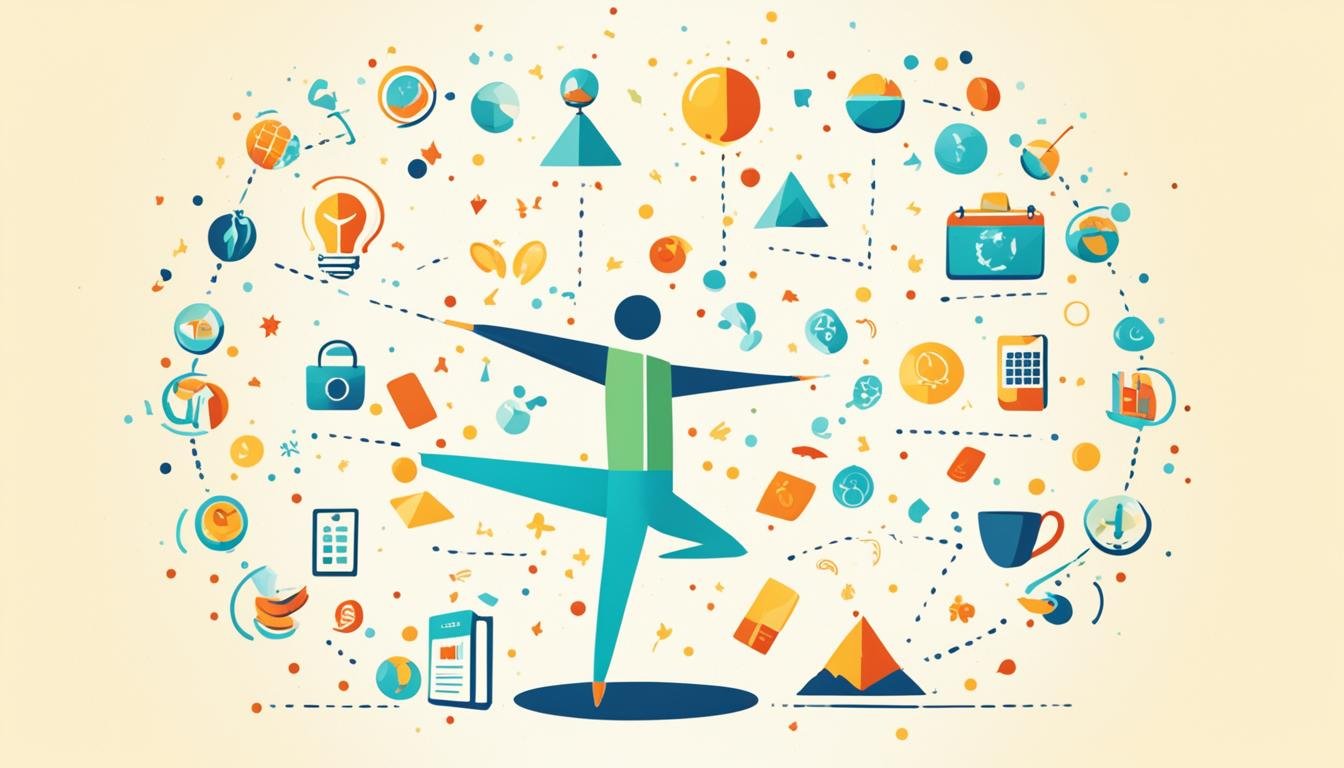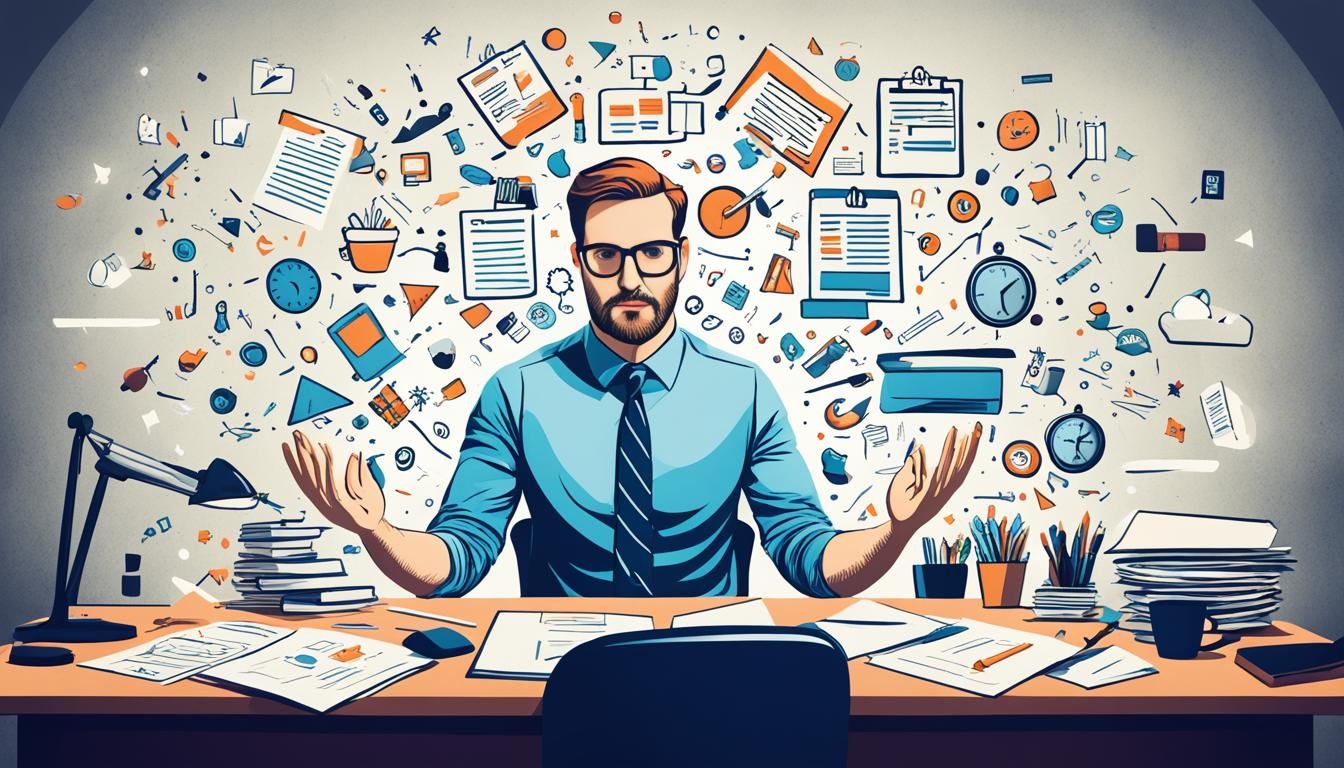Welcome to an article full of strategies and tips. These are all about boosting your concentration and focus. They can help you think clearer and be more productive. In the world we live in, it’s hard to stay focused. There are many things pulling for our attention. But these methods will help you get sharp and clear in your mind.
To concentrate means keeping your mind on one thing. It’s about not letting other thoughts or things distract you. A lot of things can make it hard to concentrate. For example, too many things going on around us, not enough sleep, sitting around a lot, eating unhealthy foods, or difficult surroundings, all these can affect our ability to focus.
In this read, you’ll get 15 ways to improve your focus and concentration. These are all backed by science and advice from professionals. If you put these strategies into your daily life, you should see a great change. You’ll be more productive and clear-minded, doing better at everything you tackle.
Key Takeaways:
- Eliminate distractions: Create a dedicated workspace free from interruptions.
- Reduce multitasking: Focus on one task at a time to enhance concentration.
- Practice mindfulness and meditation: Cultivate present-moment awareness and improve mental focus.
- Improve sleep: Ensure adequate rest to optimize cognitive function and concentration.
- Make time for exercise: Engaging in physical activity boosts overall cognitive performance.
Understanding Concentration and Its Importance
Concentration is focusing on a task or thought while ignoring distractions. It’s vital at work and everywhere else too. Knowing what boosts or hampers concentration can help us think clearer and work better.
Many things can break our focus. Noise and interruptions are major distractors. Not sleeping enough is another big challenge. It can make us foggy and affect how we focus.
Skipping exercise and eating poorly can also lower our focus. So can working in a bad space. We need to keep these in check to concentrate well.
For some, like those with ADHD, focusing can be harder. Stress and anxiety also play a big part. They can lower our attention too.
To concentrate better, we should cut distracting factors. Make our work environment better. Sleep well and exercise. Also, managing stress is key.
Practicing mindfulness and focus exercises can also help. They improve how long we can stay focused.
Learning to concentrate deeply has many advantages. Like working smarter, thinking deeply, and being more accurate. It also betters our memory and thinking skills.
By working on our focus, we unlock our true potential. We can do better in all aspects of our lives.
Strategies for Improving Concentration
Boosting your focus is key to doing well in things you care about. Use these tips to cut out distractions and focus better.
1. Eliminate Distractions
To concentrate better, cut out things like loud noises, messy spaces, and constant phone alerts. Work in a quiet place for better focus.
2. Reduce Multitasking
Doing too many tasks at once can hurt your focus. Work on one task at a time to do it well. Then, move on to the next task.
3. Practice Mindfulness and Meditation
Being mindful and meditating can make you calmer and more focused. Regular meditation can help stop your mind from wandering. This way, you can stay in the moment and perform better.
4. Improve Sleep
Getting enough sleep is vital for thinking clearly. To sleep better, keep a regular bedtime, make your sleep space comfy, and unwind before sleep.
5. Make Time for Exercise
Working out isn’t just good for your body, but also for your concentration. Do exercises you enjoy, like walking, running, or yoga, to keep your mind sharp.
6. Spend Time in Nature
Being in nature can help you focus better and feel less tired. Take walks, go hiking, or simply enjoy the outdoors. It will calm your mind and boost your focus.
7. Give Meditation a Try
Try adding meditation to your daily routine. Practices like focusing on your breath or sending kind thoughts can improve your focus and mental strength.
8. Take a Break
It’s important to give your mind breaks so it can recharge. Step away every hour or so to relax, stretch, or do something different. This keeps you sharp.
9. Listen to Music
Listening to soft, instrumental music can help you focus better. Choose music that relaxes you and sets the right mood for work.
| Strategies for Improving Concentration | Benefits |
|---|---|
| Eliminate distractions | Enhances focus and reduces mental disruptions |
| Reduce multitasking | Improves task completion and productivity |
| Practice mindfulness and meditation | Cultivates a calm and focused state of mind |
| Improve sleep | Enhances cognitive function and attention span |
| Make time for exercise | Improves mental clarity and overall well-being |
| Spend time in nature | Reduces mental fatigue and improves focus |
| Give meditation a try | Enhances concentration and mental resilience |
| Take a break | Allows your brain to reset and maintain focus |
| Listen to music | Enhances concentration and cognitive performance |
Try using these strategies every day to sharpen your focus and achieve more. Test different methods to see what works best for you. Over time, you’ll get better at focusing and reaching your goals.
Benefits of Brain Training and Gaming
Brain training games and video games help make our minds sharper. They can improve your ability to focus and think clearly. Studies show they can train your brain, make you concentrate better, and boost how you think in general.
Brain Training Games
Games meant to train the brain have become popular. They are good at making us think hard and pay attention. Sudoku, crossword puzzles, chess, and memory games improve focus and thinking by making us spend time and energy to solve problems.
Doing these games often can make your mind stay focused longer. They can help you remember things better and become quicker at understanding information. It’s like a workout for your brain, targeting specific skills to improve your overall brain power.
Video Games for Concentration
Video games are also great for improving focus and mental skills. Action-filled, strategy, and puzzle games especially help make you concentrate. They make you think quickly and pay close attention to what’s on the screen.
Video games can be fun but also a way to enhance your thinking. They make you look at complex visuals, keep track of many things at once, and decide fast. These challenges can make your focus and thinking skills much better.
But remember, not all video games are good for your brain. It’s important to pick games that make you really think, not just pass the time. Choosing games wisely can help people of any age improve how they think.
Enhancing Concentration and Improving Cognitive Function
Playing brain games and video games does more than just help you focus better. They also make you better at solving problems, help you remember more, and improve how you think generally.
They are also fun ways to keep your mind active and enjoy learning. They offer a break from regular study but still challenge your brain. This makes learning feel like a game, which can be very engaging.
It’s important to play these games in balance with other activities. Doing this regularly can really boost your brain’s power. You can focus better, think more clearly, and have a sharper mind by combining these activities with others.
Conclusion
It’s key to boost your focus and concentration for better thinking and work. You can do this by cutting off distractions, being mindful and meditating, sleeping well, moving around, and taking regular breaks. Science and top advice support these ways to think clearer and remember more.
Use these tips every day and you’ll see better memory, more work done, and smarter overall thinking. It doesn’t matter if you’re a student, a working pro, or just want to be sharper in your daily life. These methods will help your mind stay quick and active.
Getting better focus and concentration is a journey that takes time and work. But if you keep at it with these tips, you’ll make your, mind sharper and more efficient. Start now to reach your highest potential!
FAQ
What is concentration?
What factors can affect concentration?
What are some strategies for improving concentration?
Can brain training games help improve concentration?
How can improving focus and concentration benefit me?
Source Links
- https://www.healthline.com/health/mental-health/how-to-improve-concentration
- https://www.betterup.com/blog/15-ways-to-improve-your-focus-and-concentration-skills
- https://www.verywellmind.com/things-you-can-do-to-improve-your-mental-focus-4115389








GIPHY App Key not set. Please check settings